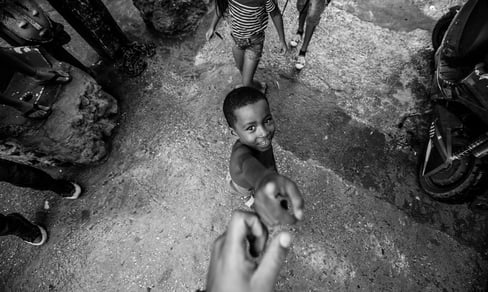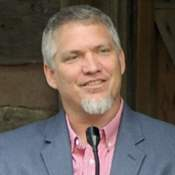The great thing about Tamarack is that we are a network of learners with some great examples of people, organizations and communities that are putting this basic concept into practice. Consider just a couple of the examples featured in the 2018 Annual Report. I loved reading from Southern Ontario where people are finding ways for residents to “come together to share their diverse gifts and work with each other for a better future,” including foreign workers. Or what about the story from New Brunswick, where an intentional asset-based approach has been used to strengthen the local economy, improve literacy levels schools, and more. What will your organization or community achieve when it learns to help people pass on their gift?
 Frederick Buechner once said, “The place God calls you to is the place where your deep gladness and the world’s deep hunger meet.” I am a Community Developer. For me, helping people, organizations and communities name and attain their preferred future story is that nexus where my deep gladness and the world’s deep hunger meet. I’ve had the privilege of doing this work in various forms in distressed urban neighbourhoods in Ohio, in struggling rural towns in Central Appalachia, and in villages and cities in Uganda and DR Congo in central Africa. During my career, I have drawn both insight and encouragement from Tamarack’s learning communities.
Frederick Buechner once said, “The place God calls you to is the place where your deep gladness and the world’s deep hunger meet.” I am a Community Developer. For me, helping people, organizations and communities name and attain their preferred future story is that nexus where my deep gladness and the world’s deep hunger meet. I’ve had the privilege of doing this work in various forms in distressed urban neighbourhoods in Ohio, in struggling rural towns in Central Appalachia, and in villages and cities in Uganda and DR Congo in central Africa. During my career, I have drawn both insight and encouragement from Tamarack’s learning communities.
My interest in the community development field was born out of my experience growing up in a remote African village. My parents were educators who chose to respond to the request by the American Baptist Church of Zaire (now DR Congo) for teachers. As a result, I was born in Congo and spent much of my life there through high school. However, we also would return to the U.S.A. at regular intervals. This early juxtaposed existence played on my young notions of fairness. Why is it, I would wonder, that my friends in Congo have just two outfits while my friends in the U.S.A have all the conveniences they wanted? As I grew older, I learned to ask other questions, such as, why do my friends who have this hard life in the Congo seem more well-adjusted, more ready to laugh and smile and enjoy friendship?
Currently, I have the distinct privilege of serving with Heifer International, an organization that does community development at an international scale. Heifer’s mission is to end hunger and poverty while caring for the Earth, a mission that we have carried with us since our humble beginnings 75 years ago. With 80% of the world’s food being grown by smallholder farmers, that’s where we concentrate our efforts to achieve this mission. And, while we’ve had our share of failures and challenges, it’s exciting to point out that we have equipped over 34 million families in that time with the tools and the training to work themselves out of poverty. I care about what I do at Heifer International because it works on behalf of people like the subsistence farming families I grew up with, but does it in a way that honours and accentuates existing intellectual, social, and other assets.
How do we walk that line of adding to a community’s standard of living without negatively affecting the relational and cultural context that is present? We do that by adhering to core principles that we call our cornerstones. The cornerstones came about through a lengthy process of collecting feedback from field staff and communities about what works. What we discovered were 12 core principles that are the unreducible factors that exist in every success we’ve had. My favourite of these cornerstones is that of “Passing on the Gift.” While we work on everything from biogas stoves to fish ponds and coffee growing to honey bees, what we are best known for is our use of livestock to generate both nutritional and economic gains for smallholder farmers. So, to illustrate this cornerstone I’ll use a livestock example.
When a community approaches Heifer for assistance, there’s usually a 6-month process that families enter in to before they receive their first livestock. During that time, they are selecting the best animal option that is both culturally and ecologically appropriate, and that meets market demand. Let’s say a community chooses milk goats as their preferred path to greater economic security. Participating families from the community will be trained in the proper care of milk goats, as well participate in group formation activities, such as exercises to determine their collective aspirations and values. The upfront expectation of time for training is part of how we ensure that people of little means make an investment in their shared future.
When the community is ready, the first families – as selected by the community – will receive their milk goats purchased locally with Heifer International’s assistance. But the key here is that the expectation is that these initial families will pass on the first female milk goat to the next set of families. Communities will often make a corporate celebration out of these “Passing on the Gift” occasions. It’s hard to describe the humanity and dignity and joy and hope that accompany these events.
What makes this process so significant is that it counters what social psychologists refer to as learned helplessness. First, this is true because when a family passes on a gift, they are being reminded that they are givers and not just clients, that they have something of value to contribute to their community and society. Second, this is true because what they are passing on – whether a milk goat, water buffalo, chicken, seedling, beehive, etc. – is essentially a small business that, properly cared for and managed, will produce a lifelong living income. The key is that one’s labor and thoughtfulness is required, which maintains a family’s sense of dignity. And finally, these “Passing on the Gift” moments remind people that it is in our shared humanity and within the bonds of caring, reciprocal relationships that we all succeed and grow.
Your program or initiative will likely look very different than that of Heifer International’s. You likely have a different kind of target audience, a different set of community dynamics, and a different mission and purpose. But surely, there is some way that you can weave into your process these strategic “Passing on the Gift” moments. There is no one that isn’t needed.So my question to you is this, how will you make sure that people – especially those on the margins – understand that they belong, that they are needed, that they have a gift to pass on that will make someone’s world better?
Take Your Learning Further:





